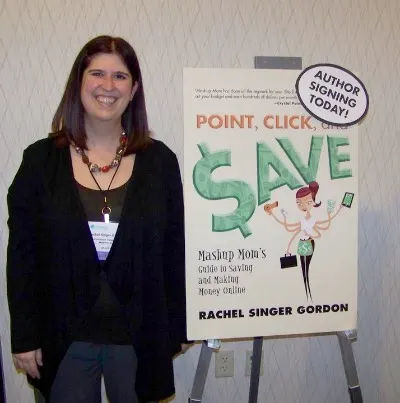
Work at Home Saturday generally features your stories of working at home and the different ways you bring in income on the side. This week, however, we'll talk about how to monetize a blog! Since Mashup Mom is shifting focus in the New Year, a couple of you have floated the idea of starting your own site -- so I thought it would be both interesting and timely to walk through the basics of how people make money from blogging.
Looking for the basics on how to start a blog in the first place? See How to Start a Blog in Five Easy Steps.
How to monetize a blog -- Four Basic Steps
When I launched Mashup Mom eight years ago, I really had no idea how people made money at it (and only a vague idea that some people actually did make money at it). Bbecause I started the site as a hobby, I made almost nothing my first year of blogging -- and, it was at least a couple of years before the blog grew into what I'd consider a viable business.
Realize going into this that blogging is no way to make money fast, and that it takes a good deal of effort to grow your blog into a steady or predictable source of income. Before you can begin to make any money from a blog, you'll first need to work on making it a consistent source of useful content -- and begin building up a base of readers or followers who appreciate the content you have to offer and the things you have to say.
How do people make money from blogging?
People make money from blogging in four main ways:
- Display advertising
- Affiliate links
- Sponsored posts
- Selling products or services
While there are a number of other possible streams of income, most fall under these four main categories. Let's talk a bit about each of these.
Display advertising
![]()
Most blogs (and most web sites in general) start with display advertising. Display ads are the graphic, or banner, ads you're used to seeing across the Internet. On a blog, you can place these in the sidebar, header, footer, and/or within the content of your site. Most bloggers use an ad network, or a company that serves as an intermediary between advertisers and content publishers. The ad network manages the ads for you so that you don't need to worry about selling advertising space on your blog directly, but takes a percentage of the profit
While there are a number of ad networks to choose from, most beginning bloggers and smaller websites start with Google AdSense. AdSense has no minimum traffic requirements, and is one of the easiest networks to set up and get started with. Once you sign up and are approved, AdSense will walk you through the process of creating the code for display ads to paste into your blog -- and you can go live with them very shortly after setting up your site if you desire.
Can you really make money with display advertising?
As a broad rule of thumb, you'll need a lot of visitors, or traffic to your site, in order to make decent revenue with display advertising. Also note that more people are now using ad blockers, and that advertising rates have been on a steady decline. Most blogs can make a little money with display advertising; very large blogs or very successful niche blogs may make a lot of money with display advertising.
Affiliate links

In affiliate marketing, a blogger signs up as an affiliate, or associate, for a company and then uses special links containing an affiliate ID (tracking code showing where the click is coming from) to promote that company's products or services. When a reader clicks on that special link and chooses to make a purchase, the blogger gets a small percentage of that sale as a commission. It's kind of like you're serving as a salesperson for that site, and earning a commission on qualifying sales you make.
Things to know about affiliate links
There are a few things to be aware of if you choose to use affiliate links on your site:
- The FTC requires a disclosure about affiliate links. Put this before the content containing an affiliate link. (On Mashup Mom, you'll see this at the top of every post with a link to click for full disclosure information. While not every post here contains affiliate links, it's easier just to code it in to your site so that the disclosure automatically appears.)
- You'll want to be sure you're only linking to products and services that are relevant to your blog niche and your audience, not just products that pay a high commission. People can tell if you are being inauthentic, and the last thing you want is to come off as spammy.
- Know the terms of service for the affiliates you're signed up with; they generally reserve the right to remove you from their program and reverse commissions if you violate those terms.
- Affiliate programs generally work on a "last clicked" model. This means that if someone clicks through a link on your blog, but then visits a site like retailmenot or Ebates (now Rakuten), uses a toolbar like honey, goes through an app, chooses to use Amazon Smile, or otherwise sends traffic through another site after clicking your link, that other site gets credit and commission for the sale -- not you.
Places to find affiliate programs
As far as single retailers go, Amazon offers the easiest and most popular affiliate program. You can find out more on the Amazon Associates site.
Most companies, however, use an affiliate network to manage their affiliate programs. When you sign up for an affiliate network, you can search for advertisers who have partnered with that network and apply individually to each. So, for instance, let's say you love Kohl's and want to link to products at Kohl's. You'd need to find the affiliate network Kohl's belongs to, join or log into that network, and then apply to Kohl's inside that affiliate network.
Here are three affiliate networks to get started with:
When you earn commission for sales you refer from different advertisers within an affiliate network, those commissions are aggregated together and you'll get paid in one lump sum by the affiliate network, rather than by each merchant individually.
Sponsored posts

With sponsored posts, a company pays a blogger a mutually agreed upon amount to write a post or a review about one of that company's products or services. Bloggers may contract directly with a company, or be selected for sponsored post opportunities through a third party network that brings together companies and "influencers," such as Social Fabric.
Things to know about sponsored posts
- The FTC requires a conspicuous disclosure if a blogger received any compensation (including non-monetary compensation, such as a product to review) to post about a company. Place this before any content and before any links back to the company.
- Google requires that sponsored post (or any "paid" links) have special "nofollow" coding so that companies can't pay their way to the top of search results by paying a bunch of other sites to link to them -- and can ding you if you don't follow their guidelines.
- You should always blog with integrity: Make sure any sponsored content is relevant to your site and to your readers, and make sure when you are reviewing a product that you're honest about your experiences. (I turn down the majority of the sponsored post requests I receive, because they're not appropriate or not a good fit.)
- Have something to say beyond sponsored content: Make sure sponsored content is only a minor part of your site.
These will probably come later, when your blog is more established
Companies that work with bloggers for sponsored posts generally ask for a media kit or other information about the blog's audience, focus, and social media presence. They'll generally want to ensure that sites they work with are family friendly, that the other content on the site is a good "fit" for their brand, and that the blog has a large enough audience to justify working with that blogger.
Selling products or services
Lastly, bloggers can make money by selling products and services on their site. Here, you will either be selling your own products & services (anything from eBooks to knitting patterns to classes to life coaching to premium content), or selling others' products & services (such as through direct sales companies like LuLaRoe or Young Living).
Here you'll want to be sure to preserve your authenticity and that whatever you choose to sell is a good fit for you, for your site, and for your audience. On Mashup Mom, for instance, I sell my own eBooks -- but I'm never going to sell oils, because that's just not me.
Some people also start blogs to provide a supporting online platform for their existing products and services. A Realtor, for instance, might blog about house hunting tips as a way to showcase her expertise, or a etsy seller might blog about her latest designs or creative process. Here you can look at your blog as a way to support your existing business and help potential customers get to know you and what you have to offer. A blog can also help create indirect income streams, positioning you as an expert in your field and opening the door to other opportunities such as speaking or writing a book.
Treat your blog like a business
If you make any money on the side from blogging, you'll need to treat it like a business. From the very start, keep track of earnings and expenses for tax purposes and be aware of the laws governing home businesses in your area. The business of blogging is well outside the scope of this post, but be aware that there will be both expenses to running your site, and tax implications from any earnings.
There's a lot more to this
Today I'm just talking about the four main ways people make money from their blogs to give you the broad outlines of how to monetize a site. If you're thinking of starting a blog in the New Year, however, you'll need first to step back and decide on your focus, think about how to create a well-written & useful site, and take the time you need to set it up.
Blogs don't write themselves -- and if you build it, they won't necessarily come. You'll need to create compelling and ongoing content, and you'll need to take the time to build a social media presence, an email list, and an audience before you can even think about making any money from blogging -- but that, my friends, is a topic for a later post. 🙂
Looking for more side income ideas?
Don’t miss: 50 legit ways to make money on the side.


Silvia Vega
Wednesday 4th of January 2017
WOW that is great!! Whoda thunk it! LOL
No really, very fascinating that blogging brings in income! I am glad it's a source of income for all that blog! Thanks Rachel!